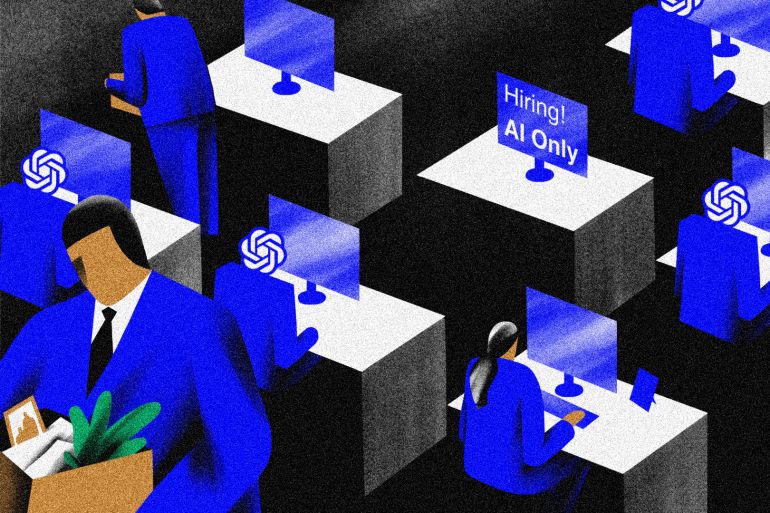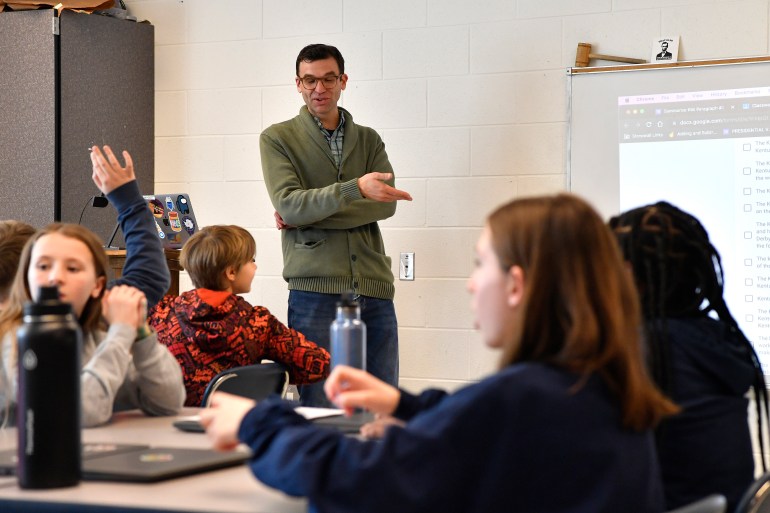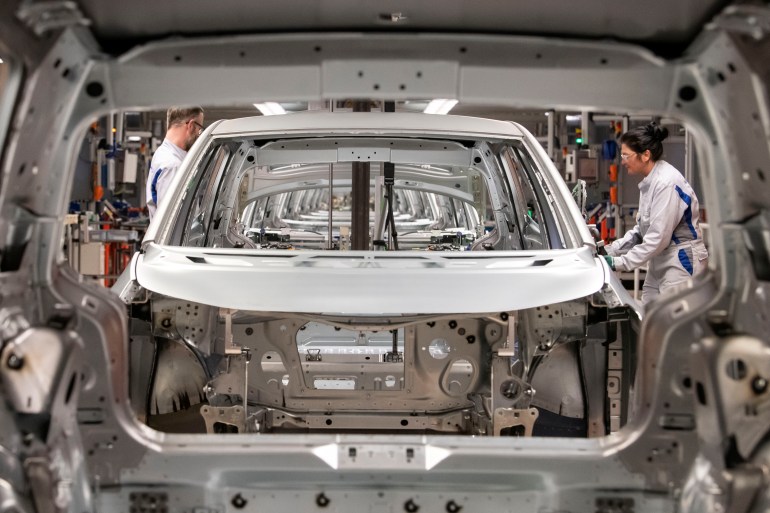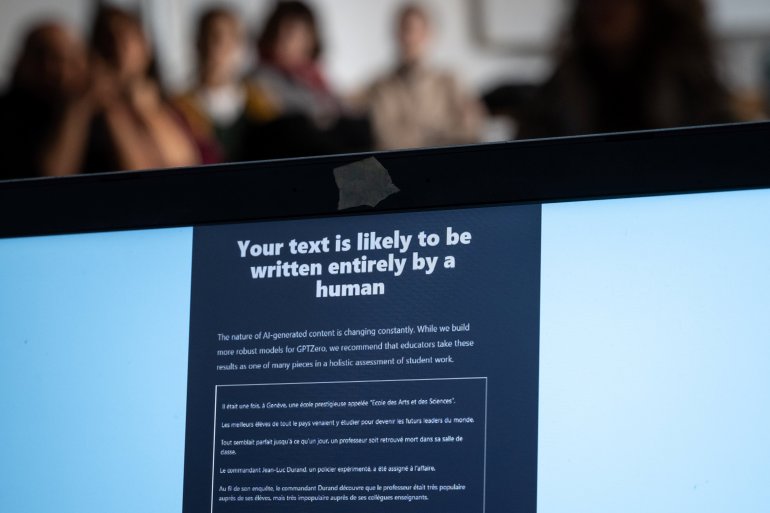Will ChatGPT take your job — and millions of others?
The latest AI wave will disrupt the workplace. Teachers could be most affected. But it could end up creating more jobs.

It is the whiz-kid of the artificial intelligence (AI) world that others are trying to emulate.
In the four months since its November 30 launch, ChatGPT has shown the ability to perform a wide range of tasks, from cracking the bar and medical licensing exams in the United States to writing emails and songs, building apps, and more.
Keep reading
list of 4 itemsTikTok says bill to force its sale would ‘trample’ free speech
In Australia, women-only app becomes latest front in war over trans rights
US Senate votes to reauthorise controversial surveillance programme FISA
The fact that it is freely available for public use has opened up a plethora of opportunities previously thought beyond the realm of possibility of AI — even though the app’s makers have faced criticism for opacity around the programming they have used to train it.
Developed by OpenAI, a company backed by Microsoft, ChatGPT became the fastest-growing consumer app in the world two months after its launch, with more than 100 million users by January.
That early success has prompted Microsoft to integrate its Bing search engine and Edge browser with the technology running ChatGPT in the hope of improving the experience of users. Last week, Google launched a similar AI app, known as Bard, after unveiling a preview of the platform in February.
Also in mid-March, China’s tech giant Baidu announced its answer to the US app — a platform called Ernie. Both Bard and Ernie have suffered from early stumbles as the AI arms race heats up.
Meanwhile, OpenAI has launched GPT-4, an upgraded version of the technology behind ChatGPT. The new platform can analyse images and more extensive texts of up to 25,000 words, create a website from a hand-drawn sketch and recreate games within seconds.
Companies are now rushing to launch products built entirely on ChatGPT in sectors ranging from customer service to financial analytics.
At a time when the International Labour Organization already estimates that 208 million people will be unemployed in 2023, will this new wave of AI dramatically increase joblessness? Which jobs would these tools potentially replace? What is the future of work?
The short answer: ChatGPT and its rival AI models could dramatically disrupt the labour market, including replacing routine jobs in some sectors. But overall, the technology could enhance productivity and complement human workers, instead of leading to unemployment, experts told Al Jazeera.

Hey, teacher, (don’t) leave that app alone
What makes ChatGPT and other similar platforms fundamentally different from previous generations of AI is the GPT — which stands for generative pre-trained transformer — bit.
Simply put, these tools use a technique known as deep learning to produce and analyse text, answer questions and perform other language and speech-related tasks in ways that can mimic human beings better than ever before.
“The impact of the generative-AI on the labour market will be really substantial,” Laura Nurski, fellow and lead of the Future of Work team at Brussels-based think tank Bruegel, told Al Jazeera. “It is being widely used as an improved search engine for gathering information, for rough drafting of texts, and for producing text in a specific writing style. This is really applicable to a lot of jobs, and in pretty much every sector.”
Yet the very nature of these AI platforms and their focus on tasks related to language interpretation means that some professions will be affected more than others, Nurski said.
A new study by researchers at Princeton, the University of Pennsylvania and New York University has found that telemarketers and teachers could be most affected.
The researchers used a benchmark known as the AI Occupational Exposure to evaluate how much services like ChatGPT could disrupt different professions. They concluded that even within the education sector, post-secondary teachers of languages and literature, history, law, philosophy, religion, sociology, political science and psychology would be most affected.
Yet that disruption does not necessarily mean that AI will take away millions of teaching jobs, the researchers behind that study and other analysts point out. These new tools could instead help teachers in some of their tasks — from assisting them in catching cheating and plagiarism to aiding them in developing teaching materials. “It will certainly automate some tasks but it doesn’t mean that the AI can do all your jobs,” Nurski said.
Meanwhile, AI’s limitations might keep a check on its ability to meaningfully replace humans. ChatGPT has been producing errors alongside its successes — a fact acknowledged by its creators who feel the technology is still “flawed and limited”. For instance, it has failed at basic math calculations and logic.
To be sure, some jobs could become redundant.
“Studies that have looked at the displacement effect have found that routine jobs, such as language translators or phone operators, will be easier to be displaced by the AI,” Georgios Petropoulos, a researcher at Massachusetts Institute of Technology (MIT) and Stanford University who studies the implications of new technologies on labour markets, told Al Jazeera.
But AI also has the “potential to create jobs,” Nurski said. Indeed, the World Economic Forum concluded in October 2020 that while AI would likely take away 85 million jobs globally by 2025, it would also generate 97 million new jobs in fields ranging from big data and machine learning to information security and digital marketing.
“What can be said with certainty is that it will change the way we work,” Nurski said.

Making work more efficient
That change will show, in part, in improved productivity, according to economists and tech analysts. There is already early evidence of this.
A new study, which has not yet been peer-reviewed, conducted by two researchers at the MIT showed that ChatGPT substantially increased productivity for college-educated professionals performing mid-level professional writing tasks.
The researchers asked 444 writers, consultants and human resource professionals to write press releases, short reports, analysis plans, and delicate emails. Half of them used ChatGPT. The study found that low-skilled workers in particular benefitted from the tool, which helped reduce the time they took — and shrunk the difference in quality between their work and more skilled workers.
That is no surprise to Petropoulos. His work has shown that in past industrial revolutions too, the displacement of jobs might have dominated in the short run, but in the long term, when the markets adapt to the automation shock, increased productivity actually sets the stage for more employment opportunities.
For instance, the arrival of automobiles reduced the importance of those whose employment depended on horses. But within a few years, the automobile industry’s success meant a demand for more and more cars — and the new jobs that came as a result.
In addition to education, the study that examined the jobs likely to be most affected by tools like ChatGPT identified legal services and securities, commodities, and investments as sectors that could be disrupted. Morgan Stanley, one of the world’s biggest investment management firms, is already developing its own ChatGPT-based AI tool.
Yet as with teachers, that effect on productivity could also simply mean that AI takes over some of the more mundane tasks in affected professions rather than replacing a workforce wholesale, experts said.
AI, they said, will not be able to replace non-routine and essential jobs, such as a lawyer who has to argue in a court, or the sensitive role of a pharmacist who has to sell prescribed drugs.
“Although you could use the assistance of a tool like ChatGPT to draft legal notes, a lawyer will still have to go to the court to defend their client,” Petropoulos said.
Ultimately, the economy — and individual companies — will need a balance, integrating human and AI labour, he said.
As he pointed out, even Tesla and SpaceX founder Elon Musk, not known to concede errors easily, “admitted some years ago that the excessive automation of Tesla was a mistake and how human labour needs to complement technology”.
And there are professions where AI might struggle to have any meaningful effect at all.

No silver bullet
The study that examined industries most likely to be affected by ChatGPT determined that jobs requiring physical labour, such as textile workers, brick masons and carpenters, will largely remain unaffected.
Most experts believe high-skilled roles are also unlikely to see as much disruption as middle-skill jobs — where expertise can at least somewhat be emulated by AI.
“Machine learning has not yet reached a level where it will necessarily replace the top-skilled jobs,” Guy Michaels, associate professor of economics at the London School of Economics, told Al Jazeera. “We are witnessing replacements for workers in the middle rung of the skill distribution.”
Nurski of Brugels said workers whose industries are affected might also be able to upgrade their skills, including by understanding and adapting to using tools such as ChatGPT.
Yet for all of its promise — and threat of disruption — AI’s ultimate success or failure might be determined not by technology but, ironically, by people.
At the end of the day, the impact of language model tools like ChatGPT will depend upon how consumers respond to services delivered by these platforms instead of humans, Michaels said. “Consumers may not find true value in machine-generated contents,” he said.
In 2020, a team of researchers in the US and China surveyed 670 online shoppers about their experience with AI customer service. Most said that they liked the fact that AI could respond to their questions more quickly, round-the-clock and more objectively. But a majority also felt humans were more likely to give them more accurate and comprehensive information.
Another study, also in 2020, sampled hotel customers in Australia. It concluded that the customers preferred dealing with human beings.
In other words, while AI-fuelled change is upon us, what that might look like is unclear.
“We have seen other technological breakthroughs in the past ranging from the invention of the engine to the introduction of computers at workplaces. We are still working, it’s just that the nature of our job has changed,” Nurski said. “Even though technology can be disruptive, we are not looking at the end of work.”
“This is not the first technological change nor will it be the last.”